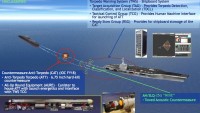US to Sharpen Military Edge in Asia; Duterte Planning to Turn the Philippines Communist?
| Arthur Dominic Villasanta | | Oct 03, 2016 05:36 AM EDT |
(Photo : US Navy) Ash Carter
The United States emphasized it will "sharpen our military edge" in Asia and the Pacific, undismayed by the palpable anti-U.S. and pro-Communist bent of Philippine president Rodrigo Duterte.
Carter said the U.S. will do this to remain a dominant power in a region bearing the brunt of Chinese military aggression in the name of alleged "historical rights," which an international court last July 12 rules was illegal.
Like Us on Facebook
In a speech aboard the U.S. Navy aircraft carrier USS Carl Vinson (CVN-70) in San Diego, Carter also revealed the next phase of President Barack Obama's pivot to Asia, or more accurately the Pivot to East Asia regional strategy. Among the key military aims of this strategy are strengthening bilateral security alliances and forging a broad-based military presence.
Carter said he next phase of the pivot will involve a rebalancing of American security commitments after years of heavy focus on the Middle East. Towards this goal, the U.S. Navy will make its attack submarines more lethal and spend more to build undersea drones that can operate in shallower waters where submarines cannot.
"The United States will continue to sharpen our military edge so we remain the most powerful military in the region and the security partner of choice," he said.
"We're going to have a few surprises as well," describing them as "leap-ahead investments."
He admitted China is "sometimes behaving aggressively," a reference to China's building and militarization of islands in the disputed South China Sea the U.S. condoned by not confronting China more forcefully.
"Beijing sometimes appears to want to pick and choose which principles it wants to benefit from and which it prefers to try to undercut," he said.
"For example, the universal right to freedom of navigation that allows China's ships and aircraft to transit safely and peacefully is the same right that Beijing criticizes other countries for exercising in the region. But principles are not like that. They apply to everyone, and every nation, equally."
Last April, Carter said he was putting "the best people and platforms forward to the Asia-Pacific" by increasing the number of U.S. military personnel in the region, and by stationing advanced weapons system.
He said these sophisticated weapons include F-22 Raptor and F-35 Lightning II stealth fighter jets; P-8 Poseidon maritime surveillance aircraft; continuous deployments of B-2 Spirit and B-52 strategic bombers and the newest surface warfare ships like the amphibious assault ship, USS America (LHA-6) that will serve as flagship for U.S. Marines' expeditionary strike groups.
Among the Asia problems is a sudden and steep deterioration in relations with the Philippines that can be traced to the obvious anti-American bias of president Rodrigo Duterte.
Duterte has long been criticized for either being a communist sympathizer or a member of the Beijing-oriented New People's Army fighting to overthrow the governments.
His first official visit as president, this to communist Vietnam, and his visit this month to China, are reinforcing the perception among a growing number of Filipinos that Duterte plans to transform the Philippines into a communist state.
His friendliness towards Russia, which was the communist Soviet Union's most powerful state before the collapse of the Soviet Union in 1991, is also troubling democratic forces in the Philippines.
©2015 Chinatopix All rights reserved. Do not reproduce without permission
EDITOR'S PICKS
-

Did the Trump administration just announce plans for a trade war with ‘hostile’ China and Russia?
-

US Senate passes Taiwan travel bill slammed by China
-

As Yan Sihong’s family grieves, here are other Chinese students who went missing abroad. Some have never been found
-

Beijing blasts Western critics who ‘smear China’ with the term sharp power
-

China Envoy Seeks to Defuse Tensions With U.S. as a Trade War Brews
-

Singapore's Deputy PM Provides Bitcoin Vote of Confidence Amid China's Blanket Bans
-

China warns investors over risks in overseas virtual currency trading
-

Chinese government most trustworthy: survey
-

Kashima Antlers On Course For Back-To-Back Titles
MOST POPULAR
LATEST NEWS
Zhou Yongkang: China's Former Security Chief Sentenced to Life in Prison

China's former Chief of the Ministry of Public Security, Zhou Yongkang, has been given a life sentence after he was found guilty of abusing his office, bribery and deliberately ... Full Article
TRENDING STORY

China Pork Prices Expected to Stabilize As The Supplies Recover

Elephone P9000 Smartphone is now on Sale on Amazon India

There's a Big Chance Cliffhangers Won't Still Be Resolved When Grey's Anatomy Season 13 Returns

Supreme Court Ruled on Samsung vs Apple Dispute for Patent Infringement

Microsoft Surface Pro 5 Rumors and Release Date: What is the Latest?














